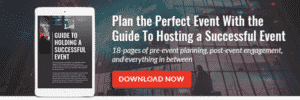The event planners of yesterday had it pretty easy; book a conference room at a hotel, set up a pipe and drape backdrop, hook a mic to a podium, and watch the guests roll in. If only! Today, much more planning goes into just about any event. And, if you’ve been involved in event planning for any length of time, you know that the industry is constantly evolving. Well, things are going to be shaken up once again in 2020. Here are some of the trends we see coming your way in New York City.
1. Venue and Room Price Hikes
Experts are expecting an increase in hotel group rates and venue rentals due to a rise in demand for meetings and events. According to the AMEX Meeting & Events Forecast, rates in North America are going to jump more than 2.4%. So what’s an event planner to do? Book early! The longer you wait, the more you’ll pay. With demand up, if you wait too long, you may not be able to find your ideal space at all. (You may also want to talk to your boss or your clients about increasing their event planning budget, too).
2. Demand For More Face-Time
Today, many of us spend a good amount of time behind a keyboard and monitor. That makes face-to-face meetings that much more important to people. In fact, a recent report reveals that Networking is the second biggest motivator for event attendees, only trailing content. So, along with setting up a space for the actual meeting, event planners should be prepared to arrange after-hours networking events or to create “huddle spaces” where teams can gather during downtime to collaborate with one another (and for some, meet face-to-face for the first time).
3. Prioritizing Experiences
As technology takes over our lives, the simple meetings and event setups of the past begin to look ancient! In 2020, expect more events to become experiential to boost attendee engagement. Of course, there are many ways to make an event experiential; it could be through lighting design, 3D projections mapping, the use of virtual or augmented reality, or social media walls. For a more in-depth look at NYC experiential events, check out our blog How To Make Your Next Event Experiential.
4. Blending Events
When an event is happening out of town, many attendees (unless required) will decide whether or not to go based on the destination in an effort to combine business and leisure. Because of this, many event planners have to wear two hats: setting up the main event, and acting as an ad-hoc travel agent. This means finding a desirable event destination, and providing attendees with “things to do” to make the trip worthwhile to them. Leading hotel chains have already jumped on this trend: Hilton recently released its Explore app to better connect guests with their host cities.
5. Finding Unique Venue Rentals
While the right audiovisual can make a world of difference in any hotel conference room venue, transforming something boring into something amazing, increasingly event planners are looking outside the box for unique venues. The Global Meetings Forecast first predicted this trend in 2018—projecting a 4% increase in non-traditional venue rentals—and expect this to come to a head in 2020 as organizations look to create more enticing, millennial- and Gen Z-friendly experiences.
6. Collecting Better Analytics
It’s not unusual for an event planner to reach out to attendees prior to an event to gauge interest, ask for speaker, entertainment, or topic suggestions, or inquire about food preferences. It’s also common for planners to poll attendees after the event, to determine what they liked, what they didn’t, and what could be done better. In 2020, however, collecting data during the event is set to really take off. Using radio frequency identification (RFID), event planners and marketers will be able to see which meetings, presentations, activities, and breakout sessions each person attended to better measure attendee engagement. This information is more useful than a post-event poll, as people aren’t always going to be honest when completing those or may simply not respond.
7. A Focus on Sustainability
Each generation is becoming more and more environmentally aware. Today, more than 85% of consumers expect companies to be socially and environmentally conscious, and to attract them it will benefit planners to create “sustainable events.” This doesn’t mean putting out recycling bins and calling it a day; rather, this may mean holding the event in a green building, serving sustainable food, and reducing single-use plastics. At last year’s 3-day IMEX event, everyone was asked to bring a reusable coffee cup; attendees were informed that in doing so, they’d prevent an estimated 37,000 cups from going into a landfill.
8. Utilization of Branded Apps
Today, there’s an app for everything, so it only makes sense that people expect an app for any substantial event they are attending. Event apps provide guests with agendas, announcements and updates, maps or hotel layout, and communication tools. Apps also allow for engagement opportunities; for example, you may use it for polling or gamification, in which guests are awarded points for each booth they stop by and stacked up against their peers for a reward.
2020 is almost upon us, and as always, the NYC event planning business should expect some changes. By staying current with these eight trends, you can remain on the cutting edge and boost attendance for your business or your clients. Planning a NewYork City event now or in the future? Talk to the experts at One Way Event Productions. We’re on top of the trends and ready to help you put on a show!


